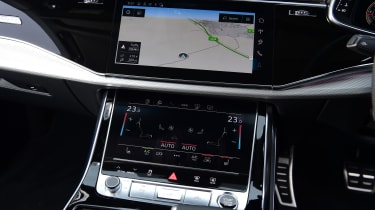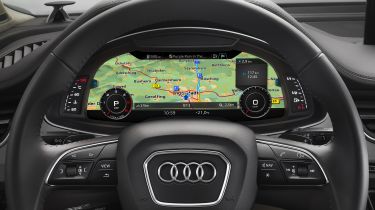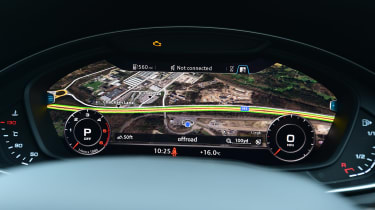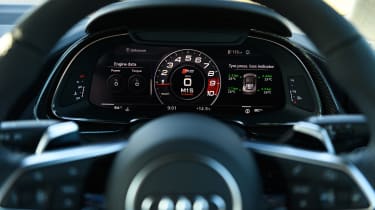Audi Virtual Cockpit explained: what is it, and should you have it?
The digital Audi Virtual Cockpit replaces traditional dials with a large configurable screen
All but the most affordable of new cars today tend to be fitted with a digital instrument cluster and Audi was one of the first brands to introduce the technology, calling its system Virtual Cockpit. This digital screen behind the steering wheel replaces the analogue speed and rev counter dials of old, providing more information in a customisable layout.
Audi still offers the system today and it comes fitted as standard to all of its new cars. If you’re planning to purchase an Audi but you aren’t sure whether Virtual Cockpit is right for you, the following guide should explain everything you need to know.
What is Audi Virtual Cockpit?
Audi Virtual Cockpit is a digital display that sits behind the steering wheel in place of a traditional set of analogue dials. The car’s speed and its engine revs are instead displayed on this screen alongside other information, such as navigation directions or your current music. The system is configurable, meaning that the driver can change the information on the screen and how it’s arranged.
This allows far more information to be displayed than a traditional set of dials would allow. If you’re using navigation, Virtual Cockpit can display the map full-screen, with speed and engine rev dials minimised in the corners. It can also display your media controls (radio stations, Spotify playlists and more) as well as your phone’s contact list if it’s been connected via Bluetooth.
In some Audi models, the Virtual Cockpit will change based on driving mode, showing a clearer view of engine revs in sportier settings, while electric Audis can show battery charge levels and energy recuperation. If you’re not interested in any of the extra functionality of Virtual Cockpit, there’s always the option to revert to two large traditional-style dials on the display for speed and engine revs.
Virtual Cockpit isn’t a touchscreen; it’s controlled by buttons on the multifunction steering wheel. The steering wheel is different to the one in models that don’t have the system included, so it’s not worth retrofitting Virtual Cockpit to an Audi that didn’t have it installed from the factory.
Is Audi Virtual Cockpit the same in every model?
No – there are some small differences between the Virtual Cockpit system between different Audi models.
The size of the Virtual Cockpit screen differs slightly between models. The latest Audis, including the e-tron GT and the Q8 SUV, have a 12.3-inch display, while other models, such as the A1 hatchback and Q3 SUV, have a 10.25-inch display.
The Audi R8 and TT coupes – now both discontinued – came with Audi Virtual Cockpit but no central infotainment screen, unlike every other Audi model. This means that their Virtual Cockpit system has some additional features, including the option to display Apple CarPlay and Android Auto. Every other Audi model displays Apple CarPlay and Android Auto on the central infotainment display.
How much does Audi Virtual Cockpit cost?
Audi now fits the Virtual Cockpit as standard to all of its new models. In the past, it was an optional extra for some models costing £1,500 but, as of 2024, you’ll find it in every Audi.
When was Audi Virtual Cockpit introduced?
It still feels like state-of-the-art software but the first version of Virtual Cockpit appeared on the 2014 Audi TT and then a rebranded version of it was used in the Lamborghini Huracan. Early iterations suffered some tech glitches and weren’t always legible in bright sunlight, but the software has been improved with bug fixes and steps to ensure the system is visible in all conditions. The current system is much more reliable, so it’s worth making sure the car you’re looking at has the most up-to-date system.
The Audi Virtual Cockpit used to be reserved for the company’s more expensive cars, including the R8 and Q7, but the technology has since trickled down to the rest of the range, so that even the brand’s smallest model, the A1, has the 10.25-inch Virtual Cockpit.
Each brand in the VW Group now has its own digital instrument cluster, with brand-specific graphics and functions, and, in some cases, slightly different names. Volkswagen and SEAT call it Digital Cockpit, whereas Skoda follows Audi’s naming convention.
Many other car manufacturers have also developed their own systems; you can get a digital instrument cluster in various Mercedes, Peugeot, Kia, Renault and Volvo models, among others.
What is Audi MMI?
Audi MMI is the company’s ‘multi-media interface’ system, which controls all of the media and infotainment functions. It comprises one or two touchscreens in the centre console that work alongside Virtual Cockpit. You can display your navigation and media playback on the MMI screen as well as Virtual Cockpit. The latest Audis use a second screen for climate controls, too.

In most cases, Audi MMI is controlled through the touchscreen, although some older models use a trackpad and scroll wheel. The Audi MMI system is compatible with Apple CarPlay and Android Auto across all new models.
Frequently Asked Questions
Read our reviews of all the current Audi models for more information…
Most Popular
Tips & advice

Car dashboard warning lights: what does each symbol mean?

Electric car charging stations: public networks, charger types, apps and maps








